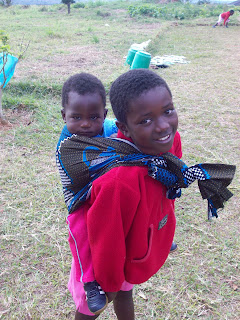1. The dirt here is red. It is not brown or gray, or even orangish, it is red. Do not confuse this with red clay... although similar in color, the consistency is that of dirt we are used to at home. This red color seems to get on the bottom of every sock and shoe, and it is all over the kids' clothes. The laundry workers hand rinse each item of clothing before putting it through the washer, just to get the red out.
2. Bananas are used here in food exactly as potatoes are used in food at home. For example, vegetable stew for dinner this week consisted of tomato, cabbage, green beans, and banana chunks that resembled potato in appearance and taste. (well, close enough.) The bananas are sometimes picked green so that they will be more starchy and less sweet. Last week we enjoyed scrambled eggs with banana instead of potato, and french fries made of bananas. YUM!
3. Paper products are not really used here. Toilet paper is imported from South Africa for the Mzuzu grocery store, but tissues can only be bought in the capital city of Lilongwe. Napkins in the dining hall are cloth, and the bathrooms at school have cloth towels instead of paper. People here are generally too poor to buy something that they will blow their nose on and throw away.
4. One of the favorite snacks here is sugar cane. You will see people carrying around big chunks of it. They rip some of the inside off and chew it in their mouths, extracting the sugary water. They spit out the bark from which the sugar flavor came, and take another bite. The paths here where the workers walk are often sprinkled with sugar cane innards. I once saw a very little baby (under a year old) chewing on a stick of sugar cane.
5. A popular form of public transportation here are bicycle taxis. Behind the "driver's seat" there is a large cushion. You will see men driving these bikes with a lady sitting sideways on this seat. (This, by the way, is considered very romantic.) We have yet to ride this form of taxi. :-)
6. Power outages here are random, relatively often, and normal. Sometimes the power will just go our for no apparent reason - maybe for maintenance, maybe something malfunctioned. People are never surprised or concerned, and within a few hours it randomly comes on again. I should also mention that the power is usually (but not always) shut off for maintenance on Sundays. So much for Sunday morning coffee!
7. Here, peanuts are known as "ground nuts." This refers to the fact that they grow in the ground - they are not ground up. It took about a week for us to figure this one out. Strangely enough, however, peanut butter is still called peanut butter.
8. The preferred way to carry a baby is on your back. The baby is strapped to the back with a piece of cloth called a "chitenji." This piece of cloth is just a big, rectangular cloth. A chitenji can also be a skirt, a head wrap, or a shawl.
9. Although an estimated 30% of all Malawians are HIV positive or infected with AIDS, it is incredibly taboo to speak about the disease. If someone dies of AIDS, you will never know it. The cause of death is usually publicly stated as the flu, or simple never stated at all - and people don't usually ask.
10. The preferred way to carry a large load is on the head. (If the load is incredibly large, say, like a new arm chair or kitchen table, this will go on the back of a bike - yes, we've seen it!) Some women will carry huge loads of wood on their heads. We once saw a woman carrying some 25 tin watering cans on her head. Most of the time these loads are carried without the assistance of hands, but sometimes you will see someone reaching up with one hand, or more rarely two.
In Christ,
Nick and Rebecca
BONUS FACT: The national dish of Malawi is "Nsima," pronounced like "seem-ah." It is the staple food of Malawi, much like bread or pasta in other cultures. Nsima is a stiff porridge made from corn flour called "ufa" (oof-ah). The Nsima is rolled into balls and dipped into various relishes, usually beans or stewed rape leaves, and very rarely meat. Stanley is extremly excited to be eating Nsima, as most children are when its on the menu.
Tumbuka Lesson: Nkhute mwa nsima! --> I love Nsima!














1 comment:
Dear Rebecca and Nick,
Thanks for keeping this blog up to date. (Becky - I keep thinking the "rattlin' blog" - you'll have to explain to Nick - for everyone else, sorry! except don't underestimate the power of the influence of Elementary School music class ;-) The posts are very informative and really closes that huge gap across the continents to hear stories and see pictures that confirm how similar we basically really all are. Seeing all of your happy faces confirms to me that you are doing great work there.
Can't wait to see you live and in person!
Nkhute mwa Rebecca and Nick!
Love,
Dad (Mr. Frye)
Post a Comment